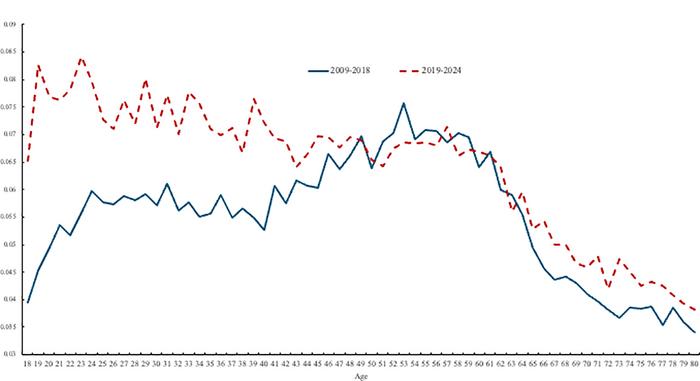Walking just 7,000 steps a day—well short of the often-cited 10,000-step goal—can significantly reduce your risk of dying early, developing heart disease, dementia, diabetes, and even depression, according to a sweeping new global study published in The Lancet Public Health.
The research analyzed data from more than 160,000 adults and suggests that even modest increases in daily step counts could deliver powerful protection against many chronic diseases.
Major Health Gains from Modest Movement
Led by Professor Melody Ding at the University of Sydney, the study pooled findings from 57 prior studies conducted in 35 cohorts across ten countries. It is the most comprehensive analysis to date of how daily step counts impact not just mortality, but a wide range of health outcomes.
Compared with walking just 2,000 steps per day, people who reached 7,000 steps saw risk reductions across several areas:
- 47% lower risk of all-cause mortality
- 25% lower risk of cardiovascular disease
- 38% lower risk of dementia
- 22% lower risk of depression
- 14% lower risk of type 2 diabetes
- 28% lower risk of falls
- 6% lower risk of cancer incidence
“Aiming for 7,000 steps is a realistic goal based on our findings,” said Professor Ding, “which assessed health outcomes in a range of areas that hadn’t been looked at before.”
Is 10,000 Steps Still the Gold Standard?
The 10,000-step target originated from a Japanese pedometer marketing campaign in the 1960s—not from scientific consensus. While this study confirms that risk continues to decline beyond 7,000 steps for some conditions, such as heart disease and cancer mortality, the added benefit is relatively modest. In most cases, health improvements start to level off after 7,000 steps.
“For people who are already active, 10,000 steps a day is great,” said Dr. Katherine Owen, a co-author and data analyst on the study. “But beyond 7,000 steps, the extra benefits for most of the health outcomes we looked at were modest.”
Every Step Counts
The researchers emphasize that even small increases in movement matter. Individuals walking only 2,000 steps a day still saw benefits by bumping up to 4,000 or 5,000 steps. These findings could be a game-changer for public health messaging.
“Our research helps to shift the focus from perfection to progress,” said Professor Ding. “Even small increases in daily movement can lead to meaningful health improvements.”
Real-World Evidence, Practical Implications
The analysis relied on wearable device data, including accelerometers and pedometers, rather than self-reported exercise. This objective approach helped clarify dose-response relationships across conditions. The most consistent benefits were seen in reduced death rates, cardiovascular events, and dementia risk. In contrast, evidence linking step counts to cancer incidence or physical function was less certain due to limited data.
The study also found that:
- Step-count benefits apply across age groups, although older adults may see continued benefit even past 10,000 steps
- Health risks decreased with every 1,000-step increase up to at least 12,000 steps per day
- The type of step-counting device (pedometer vs. accelerometer) made little difference to the overall trends
A Shift in Public Health Messaging
Researchers hope these results will encourage a more flexible, achievable approach to movement. Physical activity guidelines historically emphasize time spent in moderate-to-vigorous activity. But daily steps are easier to track and understand for many people, and they capture a range of physical movement, from brisk walks to incidental activity.
While more research is needed to tailor step goals by age, health status, and region, this study lays the groundwork for updated guidelines. Policymakers in Australia are already considering the findings for revisions to national physical activity recommendations.
What’s Next?
The authors call for more diverse studies, especially in low- and middle-income countries, and among people with disabilities or chronic illnesses. They also emphasize the need for research that goes beyond step volume to explore intensity—how fast or vigorously people are walking.
Still, the core message is clear and empowering: movement matters. And 7,000 steps a day may be just enough to change your health trajectory for the better.
Journal: The Lancet Public Health
DOI: 10.1016/S2468-2667(25)00164-1
Article Title: Daily steps and health outcomes in adults: a systematic review and dose-response meta-analysis
Article Publication Date: July 23, 2025
Related
If our reporting has informed or inspired you, please consider making a donation. Every contribution, no matter the size, empowers us to continue delivering accurate, engaging, and trustworthy science and medical news. Independent journalism requires time, effort, and resources—your support ensures we can keep uncovering the stories that matter most to you.
Join us in making knowledge accessible and impactful. Thank you for standing with us!



























































